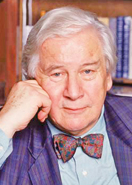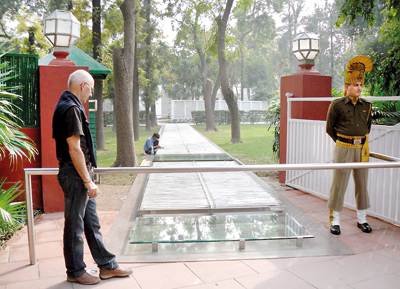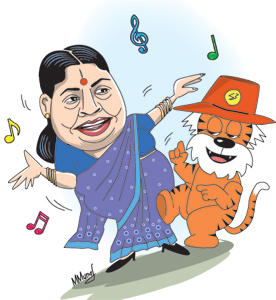Death in the garden
she was gunned down
In this little introductory aside on names and their significance, we note, as countless others must have, that the letters I-N-D-I-A appear – in sequence – in the Indian female name I-N-D-I-R-A. That a country’s name should be embedded in the name of one of its past rulers, like two interlocked crystals, one visibly contained inside the other, is intriguing.
 Indira Gandhi |
 Peter Ustinov |
The potent nature of names was the theme of a school magazine article we read years ago. Names, the schoolboy writer suggested, possess an occult power of their own, a power that can hold sway over the named person or object.
It can influence the nature of the object or person, and even define a person’s destiny. More often than not the alphabet connection is subtle, involving anagrams and the numerical equivalent of letters, and not transparently obvious as in the INDIA-INDIRA example.
Indira Gandhi presided over India asPrime Minister until her term was cut short on October 31, 1984, when she was shot dead by two Sikh bodyguards. The killing was to avenge Gandhi’s sanctioning of a military assault on the Amritsar Golden Temple, holiest of Sikh shrines, in order to contain extremist Sikhs operating from the sacred precints.
Indira Gandhi, who died 28 years ago, was back in the headlines in Sri Lanka this year as the subject of a high-profile literary seminar, the finale to the last Galle Literary Festival. The panel discussion was attended by some 1,000 guests and featured Indian writer Nayantara Sahgal and American writer and academic Katherine Frank. Both had written biographies of Indira Gandhi. Sahgal, a niece of Jawaharlal Nehru’s, described her first cousin Indira as a champion of socialist development but no economist, shaky in domestic policy but strong on foreign policy. Frank spoke about an initially reluctant politician who fast warmed up to her role.
The one-hour discussion stayed focused on Indira and India until question time, when one lone voice in the audience (someone calling himself “Adrian”) said it was only fair that the forum also evaluated the Indian leader in Sri Lankan terms. Viewed through a local lens, Gandhi appeared as no friend, the guest said; she was an active aider and abettor of hostile parties that were building up forces on Indian soil with intent to tear Sri Lanka apart some day.
The Indian writer Sahgal seemed guarded and avoided answering, saying defensively that the audience member had made a submission, not proposed a question; American writer Frank, on the other hand, energetically endorsed the criticism.
Indira Gandhi visited Sri Lanka in 1976 for the 5th Non-Aligned Summit, hosted by Sri Lanka Prime Minister Sirimavo Bandaranaike. Gandhi led the summit. Her schedule outside the official timetable included a drive along the Galle Road. Hundreds stood on both sides to get a glimpse of the Indian leader. The road was empty of traffic – an empty stage with an expectant audience. A theatre moment.
When it was Indira Gandhi’s turn to host the Non-Aligned Summit, she cut a dignified figure as she gave her televised speech. Her distinguished speaking voice went with her regal bearing. Here was a handsome, no-nonsense woman who emanated authority, but off stage was, according to her cousin Nayantara Sahgal, warm, good-humoured and most like-able. The swatch of silver hair, like that of American writer-intellectual Susan Sontag, conferred nobility, individuality.
In June 1984, Gandhi was at the fore of news broadcasts over Sikh militancy, and the build-up to Operation Blue Star that was followed by the infamous military attack on the Golden Temple.
Four months later, on October 31, 1984, BBC Television followed its coverage of the Indira Gandhi assassination that had taken place that morning with a chat with Peter Ustinov. The actor-writer was waiting to interview Gandhi for Irish Television when the prime minister was gunned down. The killing took place in the garden of Gandhi’s residence, No. 1 Safdarjung Road, New Delhi.

The site of Indira Gandhi’s assassination. Photo courtesy Chris Jordan
On TV, Ustinov made the unusual comment that “in India people seem to get assassinated in gardens.” He was linking that morning’s tragedy to the January 30, 1948 assassination of Mohandas Gandhi, which took place in the green environs of Birla Bhavan, in New Delhi.
In other references in the media to the Gandhi assassination, Ustinov commented on how the natural world acted as if nothing had happened, that “birds were singing” in the garden, indifferent to the enormity of the human tragedy that had just taken place under their beaks.
Pathetic fallacy is a literary term for the projecting of human thought and emotion into the natural or inanimate world. If you cry, the sky will darken and drip rain in sympathy. Laugh and the sun will shine upon you and birds will sing. That birds did sing after Indira Gandhi’s murder suggested a lapse on Nature’s part, a failure to register the gravity of the tragedy.
Two years later, in September 1986, Peter Ustinov was touring China as a goodwill ambassador for UNICEF. He visited Hong Kong, and we joined him for breakfast at his hotel, the former Hong Kong Hilton. The conversation was mostly about his UNICEF tour. We then brought up the Indira Gandhi assassination.
Ustinov, who died in 2004, is best known as a comedian and entertainer. The popular talk show guest’s one-man shows were sellouts. In his autobiography “Dear Me”, he moaned that his reputation as an entertainer interfered with any serious work he undertook: the public did not take his serious side seriously enough.
Peter Ustinov’s place in a footnote on one of the darker pages of modern Indian history may be his best bid at being taken seriously, for once. We asked if he minded talking about the Gandhi assassination. The tape recorder captured the historic moment as interpreted by one of the great theatre people of our time.
“She was coming towards us in the garden. We’d been with her two days on the campaign trail, and she had made an appointment for the next morning at nine. She was a little on the late side, but we were all set up to receive her. And she was killed on her way to us. It started with three gunshots.
“We couldn’t see her. It was behind the house, a kind of octagon or pentagon. I’d rather say octagon; I might be confusing if I said ‘pentagon’. And she was hit behind there when the three shots went off.
“The Indian cameraman, rather wearily, said ‘Firecrackers. Our people are awfully childish. After any large festival, there are always some firecrackers.’ And then there was a burst of machine-gun fire, and it was clear that they were no longer firecrackers. And then after a gap of about seven minutes or so there was another burst of machine-gun fire, like a settling of accounts of sorts.
“We were detained in the garden for about six hours, I think because the Indian authorities didn’t want to let the news out into the streets. But they also wanted to know whether we’d photographed anything. They wanted to see the film. I said ‘No, you can’t do that.’ They said, ‘Why not? It’s quite easy. You just take the film out, look at it and put it back again.’ Obviously, people in high places are not very technically minded.
“We came back to our hotel about 3 o’ clock, and I was told by the doorman that she was dead. I didn’t know.
“I was woken up during the night by radio television stations. The ironic thing was I was trying to get through to my wife because I didn’t want her to hear and begin to worry, and I got through just at the same time as French Television, and I had to make up my mind who I wanted to speak to, French TV or my wife. I thought, well, I owed a duty I suppose to the media because I was there, and I just had time to say to my wife, ‘Switch on the television, Channel 2,’ and I addressed a message to her on French television, killing two birds with one stone.”
We asked Ustinov about his observation that gardens in India were settings for high drama. “In India they happen in gardens. Mahatma Gandhi was also shot in a garden. And the extraordinary thing about India is that it usually takes place in almost complete silence.
In Mahatma Gandhi’s case, of course, there was an immediate reaction. But compare this with other countries where these things happen in the street, with people diving on each other and shouting ‘Lie down!’ and all those dramatics. Yes, in India they always wait for people to go into gardens before they try that sort of thing.”
Ustinov was not alone in noting the garden factor. TIME’s cover story in the week after the Gandhi assassination was headlined: DEATH IN THE GARDEN.
Ustinov’s remarks about gardens and nature’s silence alternating with bird song may seem flippant, irrelevant – even irreverent – in the context of a national tragedy, until we remember that Peter Ustinov was first and foremost a man of the theatre.
For theatre folk, setting, which includes lighting and sound, is as much a part of the texture and atmosphere of a drama, be it tragedy or comedy, as the plot and text of the play. In the same way, real-life, tragic and comic, cannot be separated from its setting.
In 1991, seven years after his mother’s death, Prime Minister Rajiv Gandhi was assassinated in a suicide bombing. The killing took place at an election rally in Sriperumbudur, Chennai. The setting was a large tree-fringed green space.
You could call it a garden.
Follow @timesonlinelk
comments powered by Disqus


























